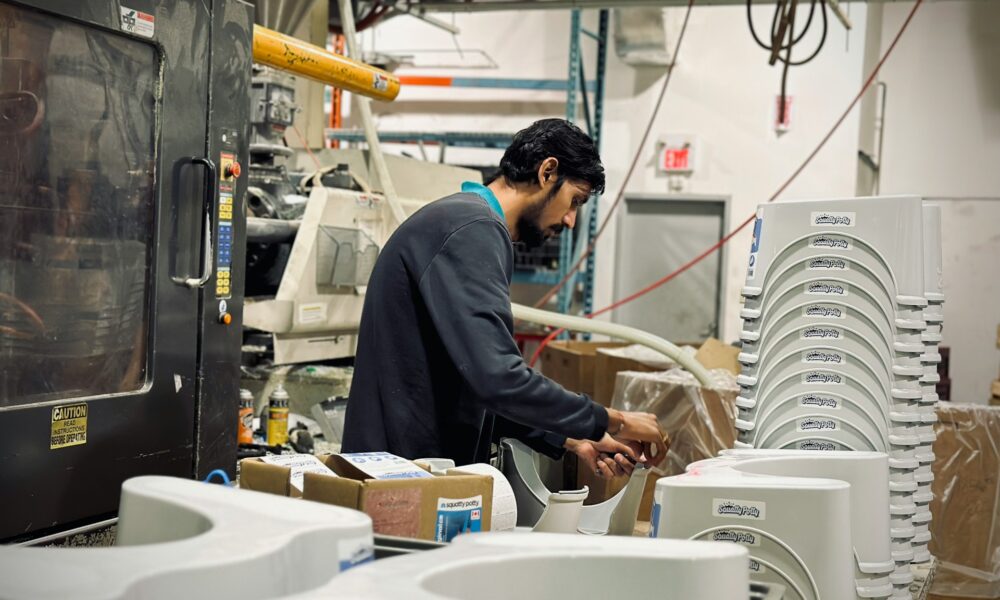How U.S.-Based Plastics Manufacturers Are Driving Innovation in the Industry

In recent years, the global plastics industry has experienced a significant transformation, driven by advancements in technology, heightened environmental concerns, and a push for more sustainable practices. At the forefront of this change are U.S.-based plastics manufacturers, who are pioneering groundbreaking methods and redefining what it means to be a leader in the modern manufacturing landscape. Through investments in research and development, the integration of smart manufacturing technologies, and a commitment to sustainability, these companies are setting new industry benchmarks.
Advanced Manufacturing Technologies
One key area where U.S. plastics manufacturers are excelling is in the adoption of advanced manufacturing technologies. Additive manufacturing, also known as 3D printing, has become a game-changer. Companies are using this technology to produce complex components with minimal material waste, shorten production cycles, and enable rapid prototyping. This not only enhances product customization but also reduces time-to-market for new products.
Automation and robotics also play a crucial role. Smart factories, equipped with interconnected systems and real-time data analytics, allow for greater precision, consistency, and efficiency in production processes. By utilizing sensors and AI-powered systems, manufacturers can monitor equipment health, predict maintenance needs, and minimize downtime, resulting in higher productivity and lower operational costs.
Material Innovation
Innovation isn’t just about how products are made, but also what they are made from. U.S.-based plastics manufacturers are in charge of developing new polymer blends and advanced composite materials that offer superior performance characteristics. These materials are being designed for greater strength, lighter weight, and enhanced durability, finding applications in industries such as aerospace, automotive, and healthcare.
Bioplastics are another area of rapid growth. Derived from renewable sources like corn starch or sugarcane, bioplastics present an eco-friendly alternative to traditional petroleum-based plastics. American manufacturers are investing heavily in the research and scalability of these materials to reduce environmental impact and meet the growing consumer demand for sustainable products.
Commitment to Sustainability
Sustainability has become a core focus for many U.S. plastics manufacturers. With increasing scrutiny on plastic waste and its effects on the environment, companies are re-evaluating their processes and supply chains to minimize their ecological footprint.
Recycling initiatives have gained momentum. Many manufacturers are implementing closed-loop systems, where plastic waste is collected, processed, and reused in the production of new items. Advanced chemical recycling technologies are also being developed to break down plastics into their original monomers, which can then be repolymerized into high-quality new plastics.
In addition to recycling, companies are designing products for end-of-life reuse. This includes creating modular designs that can be easily disassembled and repurposed, and using biodegradable materials that naturally decompose without harming the environment.
Collaborative Ecosystems
Innovation often thrives in collaborative environments, and U.S.-based plastics manufacturers are increasingly partnering with academic institutions, government agencies, and other industry players to accelerate progress. These partnerships foster knowledge-sharing, access to funding, and the development of industry standards.
Public-private initiatives such as the U.S. Department of Energy’s Advanced Manufacturing Office are providing resources to help companies adopt energy-efficient technologies and practices. Collaborations with universities and research labs are yielding breakthroughs in polymer science and process engineering.
Moreover, manufacturers are engaging in consortiums that focus on circular economy principles, working together to develop sustainable packaging solutions, enhance recycling infrastructure, and promote consumer education on responsible plastic use.
Focus on Workforce Development
As the industry evolves, so too must its workforce. U.S. plastics manufacturers are investing in training and education programs to equip employees with the skills needed for modern manufacturing roles. This includes training in digital tools, automation, data analytics, and sustainability practices.
Apprenticeship programs and partnerships with technical schools are becoming more common, helping to bridge the skills gap and attract the next generation of talent to the industry. By cultivating a skilled and adaptable workforce, manufacturers ensure they can continue to innovate and remain competitive on the global stage.
Customized Solutions for Diverse Markets
American plastics manufacturers are not only innovating in their processes and materials but also in how they serve their customers. By leveraging advanced data analytics and customer feedback, these companies are offering highly customized solutions tailored to specific industry needs.
For example, in the healthcare sector, manufacturers are producing medical-grade plastics that meet stringent regulatory standards, while offering precise formulations for applications like surgical instruments and diagnostic devices. In the automotive industry, lightweight and durable plastic components are being engineered to enhance fuel efficiency and performance.
This customer-centric approach enables manufacturers to deliver greater value and strengthen long-term relationships with clients across various sectors.
Navigating Regulatory Landscapes
Operating in a highly regulated environment, U.S. plastics manufacturers are adept at navigating complex compliance requirements. By staying ahead of regulatory changes and participating in industry advocacy efforts, these companies help shape policy frameworks that balance innovation with public safety and environmental protection.
Proactive engagement with regulatory bodies ensures that new products meet all necessary safety and environmental standards. This not only reduces the risk of non-compliance but also builds trust with consumers and stakeholders.
Embracing Digital Transformation
Digital transformation is another pillar of innovation within the U.S. plastics manufacturing sector. From supply chain optimization to predictive maintenance, digital tools are enabling smarter, faster decision-making.
Enterprise Resource Planning (ERP) systems, Internet of Things (IoT) devices, and cloud-based platforms are being integrated to create a seamless flow of information across departments. This leads to improved resource management, better inventory control, and enhanced customer service.
Moreover, manufacturers are leveraging digital twins—virtual replicas of physical systems—to simulate and optimize production processes before implementation, reducing risk and boosting efficiency.
Global Influence and Leadership
The innovations driven by U.S.-based plastics manufacturers have a global ripple effect. By setting high standards for quality, sustainability, and technological integration, these companies are influencing industry practices worldwide. Their leadership in innovation not only enhances their competitiveness but also contributes to solving global challenges related to plastic use and waste.
Exporting advanced technologies, sharing best practices, and participating in international forums allows these manufacturers to shape the future of the plastics industry globally.
Conclusion
U.S.-based plastics manufacturers are proving that innovation and responsibility can go hand in hand. By embracing advanced technologies, developing new materials, committing to sustainability, and fostering collaboration, they are transforming the industry from within. As global demand for smarter, greener plastic solutions continues to grow, these manufacturers will remain at the forefront, driving progress and setting new standards for excellence.
For any business or individual seeking a reliable, forward-thinking plastics manufacturer, the United States remains a powerhouse of innovation and leadership in this ever-evolving sector.

Source: How U.S.-Based Plastics Manufacturers Are Driving Innovation in the Industry



